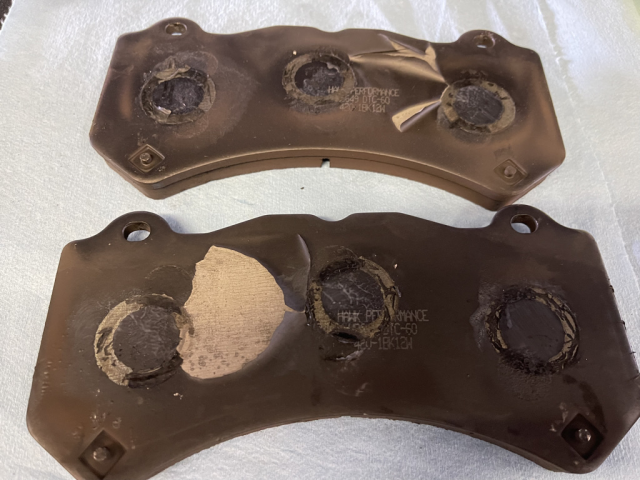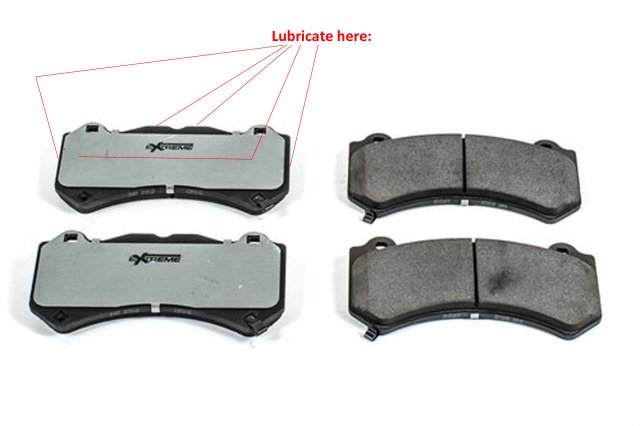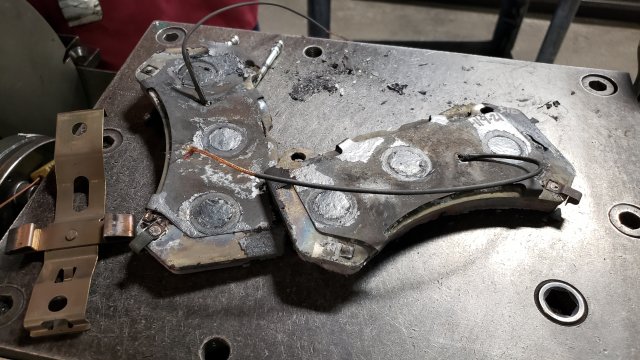All,
I always believed as a single seat Navy pilot years ago that only when you could stand up in front of your fellow pilots, including your CO, and tell them how you almost smoked yourself, could you consider yourself truly a mature naval aviator. Everybody had close calls fulfilling the attack pilot mission and in the A-7 "single seat pride of the fleet" the screw-ups that almost bought you the farm...well, no one could ever be the wiser. To share the sequence of events that led to almost hitting the ground, or another jet, in the hope you might save someone else was maturity, even if it might cost you "ace of the base" respect in the eyes of the boss.
So in the spirit of sharing a screw-up...yes, I put white lithium grease on the backs of my new Hawk DTC-60 brake pads before I went to Putnam Park on May 15/16 for four hours of curvy road course fun. Blickie and DGatzy set me straight this is an absolute no-no, due to the effect mineral (petroleum) lubricants have on rubber (destructive). I want to say thank you to them again. This was a potentially very serious error and everybody, not just people who track their cars, needs to know about it.
The sequence of events leading to this error on brake pad lubricants was simple enough. I was completely unaware of the destructive effect on rubber - in the case of our brakes the little rubber boots around the brake pistons that are in direct contact with the brake pad backing plate - that any mineral-based lubricant will have. I read product labels - nothing stated. I find it interesting that there is a truck-load of directly conflicting information about this "out there" on the internet which I've found since being alerted to this property of mineral-based products. Some recommendations to use mineral-based lubricants come from authoritative sounding sources, like this one, that says you can use white lithium grease on rubber;
How to Lubricate Rubber Bushings - And When to Replace Them
"The best lubricants for rubber bushings are silicon based lubricants,
white lithium grease or a particular rubber lubricant. You should be able to find these different lubricant types at any motor product store. Polyurethane bushings shouldn't be lubricated with oil or petroleum based lubricants. May 7, 2020.
But not on polyurethane bushings according to this source.
I tried to find warnings about using lithium grease on rubber, and the manufacturers of it don't really seem concerned about it. In fact, from WD-40 (not a lubricant, technically) on down the line of mineral-based lubricants the destructive effect of mineral/petroleum based lubricants on rubber seems to be one of opinion rather than established fact. If there ever was an example of "don't believe everything you read on the internet" this would seem to be one of them.
Anyway, you learn something new every day, or maybe you get conflicting information every day, or maybe these manufacturers know their product isn't good for rubber and just don't want to limit sales by mentioning it. The white lithium grease squeeze tube and a white lithium spray can I have - neither cautions about using it on rubber.
Second step in the chain of events...I have Z26 brake pads and they were the first brake pads I ever installed. They come with a little packet of lubricant. Doesn't say what it is on the packet, and their website doesn't say, and their "how to lubricate" their brake pad video doesn't say. In my ignorance about using lithium grease on the Hawk pads...whatever Powerstop includes as their "high temperature grease" it sure looks like white lithium grease. I'm raising my "I'm a dummy" hand because what something looks like isn't a reliable way to know what anything really is. I called Powerstop this morning and their rep said they include a silicone-based lubricant with all their pads.
DGatzy mentioned the melting point of lithium grease. I found a manufacturer of it who extolls its melting resistance to high temperatures - up to 200 degrees C, but really best recommended for applications up to 120 C - said this product guide. Wow, high temperature? Not when you buy track pads because they resist fading up to 700 C (or higher!). So "high temperature" claims are relative.
I believed the experienced pilots when I was a new guy in the squadron - I appreciated their recounting how they almost bought the farm and I tried to learn from it. Never again any mineral-based product on rubber.
And now for my burning question...what caused this?? These are the backs of the new Hawk DTC-60 front brake pads I removed yesterday from my Challenger Red Eye. I swear I put very little lithium grease on these surfaces - just rubbed some where the pistons would contact the plate. What caused the black paint to do this? Getting these plates out wasn't easy either.

Finface
1
1



